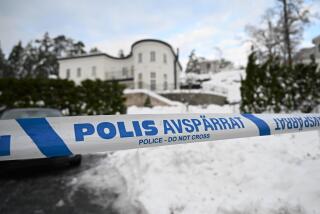U.S. Seeks Return of CIA Defector : Sweden: Edward Lee Howard is blamed for the collapse of American spy operations in the Soviet Union.
- Share via
WASHINGTON — The Bush Administration is intensifying its efforts to secure the return of Edward Lee Howard, a former CIA agent who defected to the Soviet Union in 1985 and fled to Sweden when the Communist empire collapsed, officials here indicated Wednesday.
The move comes in the wake of a fresh decision by the Swedish immigration board that, in the opinion of U.S. authorities, could provide a new opportunity for Washington to gain custody of the 40-year-old Howard, who is wanted by the FBI on charges of espionage.
The case is one of the most celebrated in recent years. Although Howard has denied spying for the Soviets, U.S. authorities have blamed him for the collapse of some key American intelligence operations in Moscow and for exposing a Soviet citizen who later was executed.
It was not immediately clear whether Sweden planned to hand Howard over to U.S. authorities, or even whether he still is in the country.
U.S. officials declined to discuss whether Washington has formally asked the Swedes to send Howard back. Legally, the United States has no extradition treaties that would provide for a fugitive’s return on espionage charges.
However, Dean St. Dennis, a Justice Department spokesman, said Wednesday that the department still is interested in the case and is “very determined that Howard stand trial” in this country.
And a key Administration official noted pointedly that the United States has mounted “extensive law-enforcement efforts” in other cases affecting fugitives who are wanted on national security-related charges.
The possibility of a break in the case came on Aug. 6, when the Swedish immigration board refused to renew Howard’s residence permit, making him eligible for expulsion from Sweden.
Technically, Howard would have 14 days from the time he was formally notified of the immigration board’s action to leave the country voluntarily. If he does not, the board theoretically could order him expelled.
Swedish officials said Wednesday that standard practice in non-controversial cases is for the government to order a foreigner returned to his native country.
But it could make an exception if a person has lived in a third country for some time and if that country--in this case, the new government of Russia--is willing to take him. It was not immediately clear whether Moscow would insist that Howard be returned there.
Swedish officials said that Howard could appeal the immigration board’s decision to a three-judge panel, which in turn could decide to refer the case to top government policy-makers.
Howard was granted a temporary residence permit in Sweden last November. Reports there said that immigration authorities rejected his application for an extension after the Swedish secret police said he had lied about his past activities in his initial residence application.
The Swedish national news agency said Wednesday that authorities there have accused Howard of cooperating with the Russian KGB since he arrived in Sweden. The agency quoted police Superintendent Jorgen Almblad as saying that Howard “could be a security risk.”
More to Read
Sign up for Essential California
The most important California stories and recommendations in your inbox every morning.
You may occasionally receive promotional content from the Los Angeles Times.











